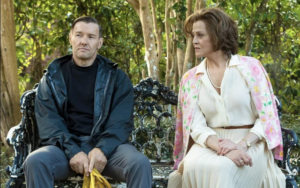MASTER GARDENER: 3 STARS. “hopeful and even-handed study of redemption.”
 For almost 50 years writer/director Paul Schrader has essayed God’s lonely men; “Taxi Driver’s” Travis Bickle, Julian in “American Gigolo” and “First Reformed’s” Reverend Toller, among others. They are isolated characters, men who live outside regular society, haunted by the lives they’ve led.
For almost 50 years writer/director Paul Schrader has essayed God’s lonely men; “Taxi Driver’s” Travis Bickle, Julian in “American Gigolo” and “First Reformed’s” Reverend Toller, among others. They are isolated characters, men who live outside regular society, haunted by the lives they’ve led.
In his latest film, “Master Gardener,” now playing in theatres, Schrader adds a new name to his soul-searching rogue’s gallery.
“Gardening is a belief in the future,” says horticulturalist Narvel Roth, played with a quiet intensity by Joel Edgerton, “that change will come in due time.” His words come steeped with meaning. A former neo-Nazi—his repulsive, racist tattoos now hidden under ever-present long-sleeved shirts—he has turned his life around and now works at the stately Gracewood Gardens. The hundred-year-old botanical beauty sits on a property owned for generations by the Haverhill family, and is the pride of mercurial old money maven Norma Haverhill (Sigourney Weaver).
Meticulous and methodical in his duties, Roth cultivates the award-winning garden with a steady hand. It’s a simple, spartan life, ruled by self-discipline and routine.
When he isn’t digging in the dirt, he occasionally visits the big colonial house for a meal, a quick tryst or a consultation with Haverhill. On one such meeting he is told that Haverhill’s biracial grandniece Maya (Quintessa Swindell) will be joining his team. The troubled young woman has fallen in with a bad crowd, and Haverhill thinks the discipline and quietude of working in the garden will straighten her out.
He agrees to show her the ropes, not realizing that her presence will upset the serenity of the garden, his new life and his relationship with Haverhill. “The seeds of love grow like the seeds of hate,” he writes in his journal.
“Master Gardener” observes racism and redemption, wondering aloud if emancipation from the stigma of past deeds is possible.
Roth is a complex character, played like a tightly wound Chauncey Gardiner, whose terrible past presents itself in flashbacks that hint at the maelstrom bubbling beneath his stoic exterior. He is a Schrader architype, a solitary man whose involvement with a protégée could complicate his life, but Edgerton sets him apart from recent Schrader characters with a mix of the serene and physical. The work is both elegant and aloof, straightforward and elliptical, and showcases Edgerton’s charisma and versatility as a leading man, when not covered in a layer of blue make-up.
He is ably supported by Swindell, who brings intelligence and understanding to the role, even if her horror at Roth’s racist past evaporates a little too easily.
Weaver, as a stereotype of every isolated wealthy matron, chews it up, delivering lines like, “I thought you had a green thumb, but it turns out you have a green middle finger,” with gusto.
“Master Gardener” is apparently the wrap to Schrader’s recent Calvanist guilt trilogy. While interesting and as rich in allegory as the previous two films—”First Reformed” and “The Card Counter”—its study of redemption, while hopeful and even-handed, requires too many leaps of logic to fully embrace.
